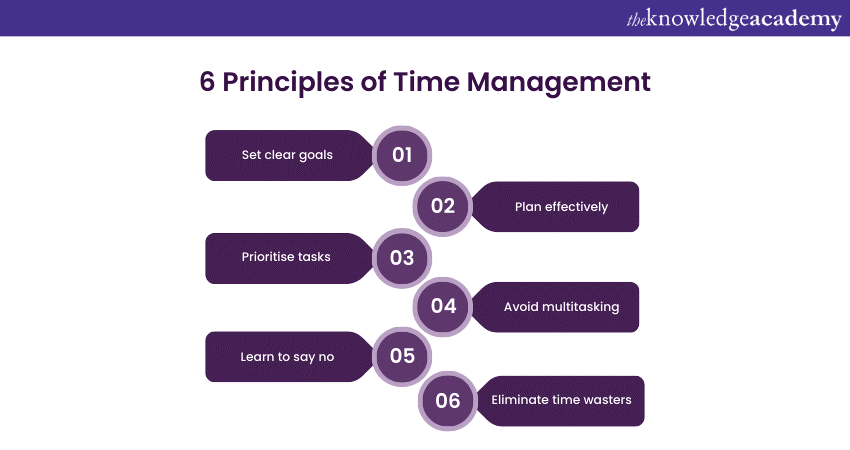Effective time management is essential for enhancing productivity and achieving personal and professional goals. Numerous principles guide individuals to organize their tasks, prioritize their responsibilities, and maintain a balance between work and personal life. Below, we explore the key principles of time management drawn from various sources.
The Importance of Planning

Planning is the cornerstone of effective time management. It involves identifying tasks and organizing them into a coherent schedule. As explained, 'Planning requires you to work out and write down everything that you need to get done'[1]. This could involve creating to-do lists or utilizing digital tools such as Trello to visualize tasks. Proper planning allows individuals to focus on what needs to be done rather than getting overwhelmed by details.
Additionally, effective planning enhances clarity and focus, helping individuals to avoid distractions. It is vital to “think of your day in terms of time, not the tasks you have to do'[9]. This approach enables one to allocate specific time slots to significant tasks, fostering a more organized and productive daily routine.
Setting Priorities

Prioritization is crucial in ensuring that time is spent on tasks that yield the most significant results. According to the Eisenhower Matrix, tasks can be categorized into four quadrants based on their urgency and importance: urgent and important, important but not urgent, urgent but not important, and neither urgent nor important[5]. By classifying tasks this way, individuals can strategically decide which responsibilities to tackle first, allowing them to focus on what truly matters.
A common guideline suggests that 'efficient resource allocation involves focusing on the key objectives'[8], ensuring that efforts are channeled towards high-impact activities. This principle also helps mitigate overwhelm by clarifying which tasks should be completed immediately and which can be deferred or delegated.
Scheduling Tasks

Proper scheduling is the next step after planning and prioritizing. It involves committing to specific time slots for each task, effectively blocking out time in one’s calendar. Scheduling should be flexible enough to accommodate unexpected tasks while maintaining a structure to ensure accountability. “Each task should have its own unique timebox that lasts no more than three hours”[4] to facilitate focused work sessions.
Using a combination of scheduling methods, such as time blocking and the Pomodoro Technique, can enhance concentration and allow for regular breaks, which are essential for maintaining productivity[6][7]. Such methods counteract the chaotic nature of daily work and help individuals create clear boundaries between various responsibilities.
Staying Organized

Organization is integral to effective time management. This involves determining the necessary tools, resources, and support systems required for efficient task completion. Techniques like maintaining a clean workspace and using task management apps help streamline processes[7].
Moreover, regular reviews of shared responsibilities can aid in identifying which tasks can be delegated, thus allowing team members to focus on their strengths. “Delegating tasks to others is a valuable strategy for improving time management and boosting productivity”[2]. By ensuring that individuals are working on tasks they excel at, organizations can enhance overall efficiency.
Embracing Discipline and Avoiding Distractions

Discipline is fundamental in adhering to a time management system. “A lot of people fail when it comes to time management because they are not disciplined enough with sticking to their system'[1]. Cultivating a strong sense of commitment to one’s planned schedule can lead to increased consistency and improved time use.
Additionally, avoiding distractions is critical for maintaining focus. “Distractions take away from the time you should be working”[7]. Setting boundaries around communication, silencing notifications, and creating a conducive work environment are all strategies that can foster higher productivity levels.
The Role of Self-Care

Lastly, prioritizing personal well-being is a vital yet often overlooked component of effective time management. “Make time for enjoyable, rejuvenating, and satisfying activities”[9]. Incorporating self-care routines into one’s schedule can reduce stress, increase motivation, and facilitate better performance at work. When individuals manage their stress levels and engage in enjoyable activities, they can return to their tasks with renewed energy and focus.
Conclusion
Incorporating these principles of time management can significantly enhance productivity, reduce stress, and create a more balanced life. By focusing on planning, prioritizing, scheduling, staying organized, embracing discipline, and maintaining self-care, individuals can not only manage their time more effectively but also achieve their broader goals with greater ease. Time management should thus be viewed as an ongoing process of improvement, requiring regular reassessment and adaptation to meet evolving challenges and priorities.
Get more accurate answers with Super Pandi, upload files, personalized discovery feed, save searches and contribute to the PandiPedia.
Let's look at alternatives:
- Modify the query.
- Start a new thread.
- Remove sources (if manually added).